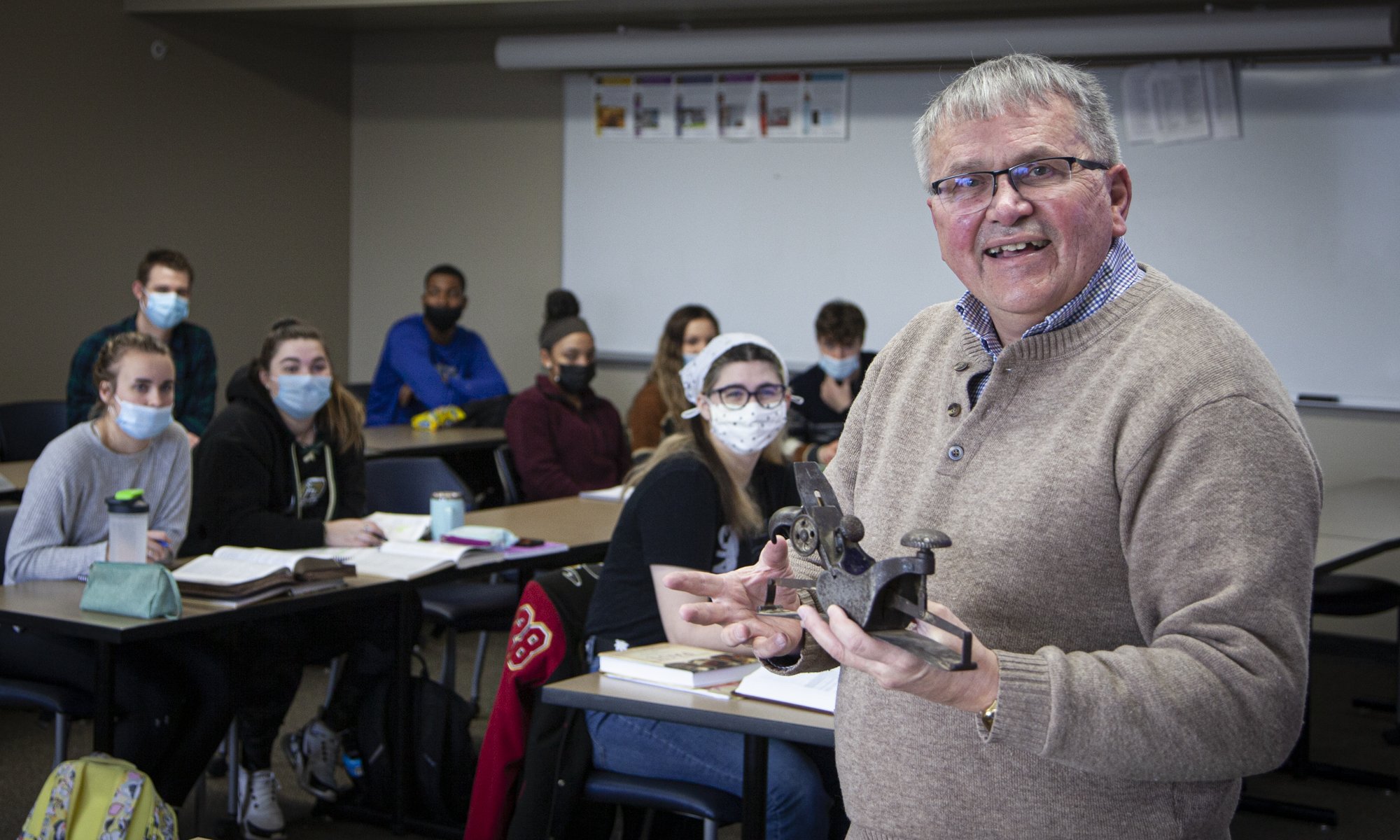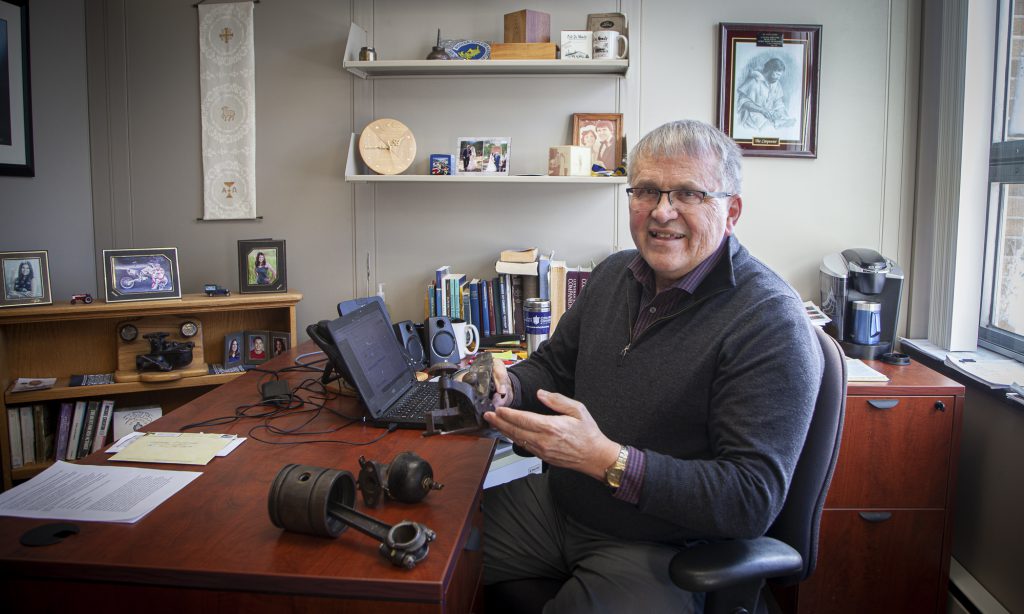
Rev. Dr. Dan Paavola uses all kinds of crazy things to drive home his teaching—in the classroom and in the Chapel.
To some around the CUW campus, Rev. Dr. Dan Paavola is seen as this crazy guy who rides a motorcycle to work almost every day—even sometimes in very cold weather. And it’s true! (The riding part, not necessarily the crazy part.)
You can often see him walking the halls carrying his motorcycle helmet and riding jacket. But if you do, he may not be heading to or from his 2001 Honda VFR; he may well be on his way to or from a class. The riding gear? He uses it to make some very profound points about the armor of God described in Ephesians 6:10-18.
“I’ll ask a student, maybe Sarah, who I’ve talked to ahead of time, to put on the jacket, and my electric vest—and she’s just swallowed up in it,” Dr. Paavola explains. “And I say, ‘It doesn’t really fit, does it!?’ No! But it’s really good, armored stuff. ‘You’d be really safe in it.’
“And I say, ‘How do you think you’d fit the armor of God? Do you think you’d fit?’ Uh, no. And isn’t that the wonder! That God doesn’t dress us in stuff His size. He puts His armor on us, and it fits! It actually fits well enough that we can live in it, and work in it, and have it on every day. Amazing!”
What’s also amazing is how excited Dr. Paavola gets while explaining these concepts. After decades of preaching and teaching, it’s as if these insights into God’s Word are new and fresh every time. But wait, there’s more!
“’And if you have this on, how do you feel about the weather?’ he asks the student. “’Let me tell you, it’s waterproof, it’s windproof, and look at this [the electric vest]—it’s warm! You’re plugged in! Just like the armor of God, wearing it gives you a whole different perspective on those storm clouds that are coming.’”
Three-dimensional Illustrations
Using props, or visual aids, or “show and tell,” as he calls it, is a staple of Dr. Paavola’s preaching and teaching. He’s been doing it for many years, since he began his career as a parish pastor in tiny Butternut, Wisconsin. It was there, where he served 12 years, that he first started working actual objects into his object lessons.

“The best advice I ever got was from a guy named Charlie Mueller, at a pastor’s conference the second year I was there, must have been about 1985,” he explains. “He said, ‘Tell stories and paint pictures.’ I thought, ‘I like stories! I can do that!’”
After all, Jesus Himself was a master storyteller, frequently using parables to make His teaching more relatable. In the same way, Dr. Paavola uses things to illustrate his stories and drive home the lesson.
One of his early efforts involved asking his parishioners in Butternut if he could borrow a tackle box—and underestimating their enthusiasm for their fishing gear.
“I don’t fish, but up there, it’s pretty easy to get people to volunteer a tackle box!” he recalls. “’Look at this one, look at this one!’ Fortunately, we had three services, so we could switch it around.”
Sometimes, as with the tackle boxes, he comes up with a new item for a specific topic. This fall, for instance, he picked up a fallen leaf to make a point about Psalm 16:5-6 (“The boundary lines have fallen for me in pleasant places”). Often, he relies on his regular go-to items, such as his riding gear, a 1920 Model T carburetor, his favorite books from childhood, or his grandfather’s carpentry tools.

Recently, in his “The Life of Paul” class (REL356), he used a gray hooded sweatshirt and a Boston Marathon jersey (he’s run the race four times!) to talk about things, including Bible verses, that are meant for general purposes vs. specific applications. He uses the carburetor, along with a cast-iron piston and connecting rod, to discuss the difference between what’s happening on the inside (of a car or a person) vs. what we see on the outside, as Paul addresses in his epistle to the Galatians.
Some years ago, Dr. Paavola used Beanie Baby toys and an obsolete iPod to emphasize how the value of earthly things doesn’t last, while our relationship with Jesus remains priceless.
“That’s Philippians Chapter 3,” he explains, “where Paul goes through the litany of things he accomplished, his legalistic righteousness, he’s faultless. And then in verse 7, he writes, ‘Whatever I counted as gain, I now consider it as loss for the sake of gaining Christ.’”
Connecting Rods, Connecting Students
Sometimes the objects don’t just illustrate a point. They help students come out of their shells.
“First time I used the Model T carburetor, I held it up and I said to the class, about 30 students, ‘What is it?’” Dr. Paavola recalls. “Of course, they’d never seen a 1920 carburetor. One student answered, ‘Is that one of those old-fashioned irons that you have to heat on the stove to iron your clothes?’ I thought, ‘Well, if you can iron something flat with this, you are really good!’

“And then this really quiet young man, Dave, who we rarely got an answer from, said, ‘It’s a carburetor.’ I said, ‘Dave! Absolutely! And what does a carburetor do?’ And he explained it to the class. And he made a connection. He knew what 29 other people didn’t know and had a chance to shine. And it was great!”
That’s probably the most important point. He doesn’t use his “show and tell” items just because it’s fun. He uses them to make deep and important theological concepts more relatable and memorable. To connect with students in new and interesting ways. In other words, to make a lasting difference in the lives of the students he teaches and colleagues who hear him preach.
What’s Old is New Again
Here’s one more quirky, endearing thing about Dr. Paavola. On his office wall right now is a motorcycle calendar from 1977. In his home office is an International Harvester calendar from 1955. “That one hung in the milking barn on our dairy farm when I was a boy,” he explains. But why 1977 and 1955? Because those two years line up exactly, the dates and the days of the week, with 2022, making the calendars just as functional today as they were decades ago.
What’s the object lesson for that, you may ask?
“Oh, that’s a good one!” he says. “I don’t know, maybe Ecclesiastes: ‘What has been will be again, what has been done will be done again.’”
Perhaps. But one thing is for sure: There will never be another Dan Paavola.

For more information about Theology programs at Concordia University Wisconsin, visit cuw.edu.
— This story is written by Mike Zimmerman, corporate communications manager for Concordia University Wisconsin. He may be reached at michael.zimmerman@cuw.edu or 262-243-4380.
If this story has inspired you, why not explore how you can help further Concordia's mission through giving.